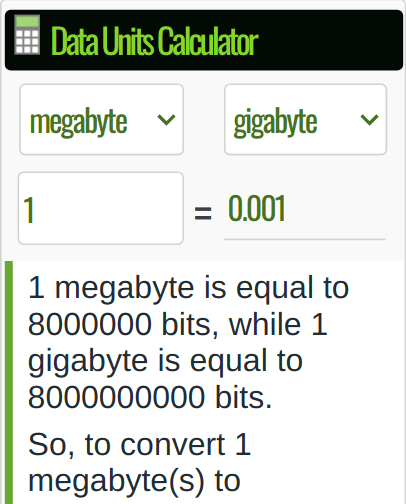How to convert 64 kilobytes in terabytes
Data Units Calculator
Here is the answer to questions like:Convert 64 kB to TB. What is 64 kilobytes in terabytes? How many kilobytes in 64 terabytes?
Use the Data Units or Storage Converter above not only to convert from kBs to TBs, but to convert from/to many data units used in computer memory.
Byte conversion chart for binary and decimal conversion
The chart below tries to explain the 2016 scenario. These definitions are not a consense. The usage of units like Kibibyte, mebibytes, etc. (IEC) is not widely known.
Binary System (traditional)
In Data storage, traditionally, when describing digital circuitry, a kilobyte is 210 or 1,024 bytes. This arises from binary exponentiation common to that circuits. This is the so called BINARY system where multiple of bytes are always some exponent of two.
The binary prefix kibi (old k) means 210 or 1,024, therefore, a 1 kibibyte is 1,024 bytes. The units (Kib, MiB, etc) were established by the International Electrotechnical Commission (IEC) in 1998. These units are used for random-access memory (RAM) capacities, such as main memory and CPU cache sizes, due to the binary addressing of memory. See some examples:
- 1 byte (B) = 8 bits (b)
- 1 kibibyte - KiB | traditional Kilobyte - KB = 210 bytes = 1,024 bytes
- 1 mebibyte - MiB | traditional Megabyte - MB = 220 bytes = 1,048,576 bytes
- 1 gibibyte - GiB | traditional Gigabyte - GB = 230 bytes = 1,073,741,824 bytes
- 1 tibibyte - TiB | traditional Terabyte - TB = 2^40 bytes = 1,099,511,627,776 bytes and so on ...
The Decimal System (SI)
Recently, most hard disk manufacturers use decimal megabytes (106) which is slightly different from the decimal system for small values and considerabily different for values of the order of Terabytes and it gets confusing. This is the so called DECIMAL system where multiple of bytes are always some exponent of ten as shown below:
- 1 byte (B) = 8 bits (b) (one byte is always 8 bits)
- 1 kilobyte (kB) = 103 bytes = 1,000 bytes
- 1 megabyte (MB) = 106 bytes = 1,000,000 bytes
- 1 gigabyte (GB) = 109 bytes = 1,000,000,000 bytes
- 1 terabyte (TB) = 1012 bytes = 1,000,000,000,000 bytes and so on ...
Please, check the tables below for more units.
Multiples of bit
| Unit | Symbol | In bits |
|---|---|---|
| Bit | bit | 1 |
| Kilobit | kbit | 10001 = 1000 |
| Kibibit | Kibit | 10241 = 1024 |
| Megabit | Mbit | 10002 = 1000000 |
| Mebibit | Mibit | 10242 = 1048576 |
| Gigabit | Gbit | 10003 = 1000000000 |
| Gibibit | Gibit | 10243 = 1073741824 |
| Terabit | Tbit | 10004 = 1000000000000 |
| Tebibit | Tibit | 10244 = 1099511627776 |
| Petabit | Pbit | 10005 = 1000000000000000 |
| Pebibit | Pibit | 10245 = 1125899906842620 |
| Exabit | Ebit | 10006 = 1000000000000000000 |
| Exbibit | Eibit | 10246 = 1152921504606850000 |
| Zettabit | Zbit | 10007 = 1000000000000000000000 |
| Zebibit | Zibit | 10247 = 1180591620717410000000 |
| Yottabit | Ybit | 10008 = 1000000000000000000000000 |
| Yobibit | Yibit | 10248 = 1208925819614630000000000 |
Multiples of byte
| Unit | Symbol | In bits |
|---|---|---|
| Byte | B | 8 |
| Kilobyte | kB | 10001 = 8000 |
| Kibibyte | KiB | 10241 = 8192 |
| Megabyte | MB | 10002 = 8000000 |
| Mebibyte | MiB | 10242 = 8388608 |
| Gigabyte | GB | 10003 = 8000000000 |
| Gibibyte | GiB | 10243 = 8589934592 |
| Terabyte | TB | 10004 = 8000000000000 |
| Tebibyte | TiB | 10244 = 8796093022208 |
| Petabyte | PB | 10005 = 8000000000000000 |
| Pebibyte | PiB | 10245 = 9007199254740990 |
| Exabyte | EB | 10006 = 8000000000000000000 |
| Exbibyte | EiB | 10246 = 9223372036854780000 |
| Zettabyte | ZB | 10007 = 8000000000000000000000 |
| Zebibyte | ZiB | 10247 = 9444732965739290000000 |
| Yottabyte | YB | 10008 = 8000000000000000000000000 |
| Yobibyte | YiB | 10248 = 9671406556917030000000000 |
Sample data units conversions
Disclaimer
While every effort is made to ensure the accuracy of the information provided on this website, neither this website nor its authors are responsible for any errors or omissions. Therefore, the contents of this site are not suitable for any use involving risk to health, finances or property.
